|
|
|
Sort Order |
|
|
|
Items / Page
|
|
|
|
|
|
|
| Srl | Item |
| 1 |
ID:
147960
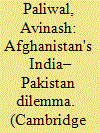

|
|
|
|
|
| Summary/Abstract |
This article seeks to examine the foreign policy behaviour of weak states in regions marked by politically turbulent geostrategic environments. An analysis of Afghanistan's foreign policy behaviour vis-à-vis Pakistan and India lends focus to this aim. India–Pakistan rivalry has gained traction as a key factor in determining Afghanistan's stability in the wake of the drawdown of Coalition forces. Missing from this debate, however, is consideration of Afghanistan's agency as a weak state with an independent set of policy preferences. Based on primary interviews with a diverse set of Afghan political actors the article outlines two competing policy advocacies: Pakistan friendly and Pakistan averse. The article argues that these advocacies are key to understanding Afghanistan's India–Pakistan dilemma. Departing from the ethnic lens used to explain Afghan politics and its regional linkages, this article shows that Kabul's relations with Islamabad determine its approach towards New Delhi regardless of ethnic rivalries. Understanding domestic Afghan narratives in this regional context is therefore imperative to adequately assess South Asia's prospective security calculus.
|
|
|
|
|
|
|
|
|
|
|
|
|
|
|
|
| 2 |
ID:
147957
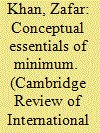

|
|
|
|
|
| Summary/Abstract |
Very little is known about Pakistan's nuclear policy and, in particular, about its adoption of minimum deterrence, given the existence of nuclear ambiguity and the absence of public, official documentation of Pakistan's understanding of minimum deterrence. Therefore, despite its innocuousness, ‘minimum’ remains a vague and complex phenomenon short of definitional concreteness when it is brought to a real conceptual test. On the one hand, minimum is regarded as a small number of deterrent forces arguing against expansion and arms competition, while, on the other hand, it is viewed as a relative, and therefore continually evolving, concept depending on the region's fast-changing strategic environment. A conceptual basis for the concept of minimum is explored, leading to the question: why does Pakistan pursue minimum deterrence? It traces out the rationale of Pakistan's minimum deterrence as conceptualized following the 1998 nuclear tests. This rationale of Pakistan's minimum deterrence is then analysed in light of the essentials of minimum deterrence in order to see whether it is consistent with the basics of minimum as conceived here.
|
|
|
|
|
|
|
|
|
|
|
|
|
|
|
|
| 3 |
ID:
147974
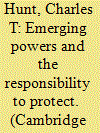

|
|
|
|
|
| Summary/Abstract |
The perceived clash of norms associated with the emergence of rising powers is nowhere more pronounced than in relation to the responsibility to protect (RtoP). However, attempts to explain rising powers’ engagement with norms such as the RtoP are often limited and limiting in what they can tell us. Orthodox models portray predominantly linear and diffusionist logics of norm evolution that underplay the complex interaction implicit in unpredictable outcomes at the systemic level. This article identifies a range of factors that drive participation (or generate hesitation) amongst emerging powers in the development and application of the RtoP. It proceeds to illustrate how changes in normative behaviour emanate from top-down and bottom-up processes as well as the feedback between them. It argues that norm evolution is consequently a unique and emergent outcome of complex international society and therefore argues for using complexity thinking as a heuristic to augment current models and explanations of the evolution of norms in the international system.
|
|
|
|
|
|
|
|
|
|
|
|
|
|
|
|
| 4 |
ID:
147967
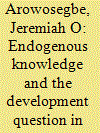

|
|
|
|
|
| Summary/Abstract |
An apt analogy for speaking to Africa's experience with development is offered by the twinning of colonialism and modernization. While colonialism left behind some forms of hybridity and mimicry, the urge to decolonize—to be free from the colonizer's control in every possible way—was integral to all anti-colonial criticism after the Second World War. The politics of decolonization followed by the new states in the mid twentieth century, however, displayed an uncritical emphasis on modernization, in which development, pursued—with technology and tools of scientific progress—was a catching-up exercise with the West. As an epistemological export from the West, taking the form of science as hegemony and ideology within colonial discourse, this has not delivered material progress for Africa. The widespread concern about the intractability and magnitude of the problems facing the continent has made development a popular theme in the literature on African studies. The disappointment across various academic circles and the popular press over the dwindling prospects of development in Africa—illustrated in its food insecurity, low life expectancy and the familiar litany of its ills—has made revisiting the debates on African development both compelling and timely. Much has consequently been written on what development is or should be about in Africa. This article underlines the centrality of endogenous knowledge as the material precondition for autonomous development for Africa.
|
|
|
|
|
|
|
|
|
|
|
|
|
|
|
|
| 5 |
ID:
147972
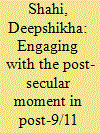

|
|
|
|
|
| Summary/Abstract |
9/11 and the subsequent war on terror in Afghanistan have severely challenged the idea of a world politics based on secular modernity. While the post-9/11 Afghan society remains troubled with the post-secular conflict between the so-called Islamic-terrorist and secular-democratic forces, the need for a ‘humanist’ political discourse that could pave the way for peace has become paramount. This paper explores the viability of ‘post-Islamism’ as an alternative humanist political discourse. It sets out to demonstrate how a post-Islamic humanist discourse, which is defined by the dialogic process of developing a hermeneutical understanding of Islamic philosophy, has the potential to not only carve the way for peace amidst perilous entanglement between politics and religion in post-secular Afghanistan, but also vindicate Islam of its unjustified denigration in the contemporary world.
|
|
|
|
|
|
|
|
|
|
|
|
|
|
|
|
| 6 |
ID:
147963
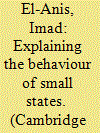

|
|
|
|
|
| Summary/Abstract |
Conventional analyses claim that small states bandwagon with leading international powers. The dominant view is that small states' vulnerabilities and limited power hinder their ability to pursue policy goals. This study critiques this position by investigating why and how Jordan continues to pursue a nuclear energy programme despite objections from the United States—its principal ally. By using theories of small states, this study analyses discursive practices in Jordanian policymaking. This approach is used to describe Jordan's nuclear energy policy and posit a logic of the effects that energy insecurity has on the government's perception of Jordan as a ‘small state’. I use this to create hypotheses concerning the conditions under which small states may not simply bandwagon with key international allies, but may have more freedom to pursue their goals than traditional analyses predict. Explanations that assume small states always have limited freedom to pursue policy goals without the backing of key allies are not supported by the evidence considered here.
|
|
|
|
|
|
|
|
|
|
|
|
|
|
|
|
| 7 |
ID:
147970
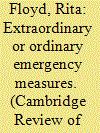

|
|
|
|
|
| Summary/Abstract |
This paper is concerned with two interrelated problems in the Copenhagen School’s (CS’s) securitization theory. The first is the challenge that non-exceptional security polices pose to the theory, which starts from the assumption that securitization is ‘successful’ only when extraordinary emergency measures are adopted. The second arises not from what factors define securitization’s ‘success’, but rather from who does so. Securitization theory suffers from a constructivist deficit because the criterion for the ‘success’ of securitization is set by scholars, whereas a more ‘radically constructivist [theory] regarding security’ would require practitioners to be in charge of defining the ‘success’ of securitization. The paper offers a solution to both of these problems by suggesting that securitization is ‘successful’ only when (1) the identification of a threat that justifies a response (securitizing move) is followed by (2) a change of behaviour (action) by a relevant agent (that is, the securitizing actor or someone instructed by the same), and also (3) the action taken is justified by the securitizing actor with reference to the threat they identified and declared in the securitizing move. It goes on to reject the ideas of a sanctioning audience and of the insistence on existential threats as also set by the CS.
|
|
|
|
|
|
|
|
|
|
|
|
|
|
|
|
| 8 |
ID:
147956
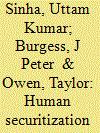

|
|
|
|
|
| Summary/Abstract |
In the large and growing literature on hydropolitics, insecurity generated through water-related conflicts is most often conceptualized under a model of economic resource scarcity. Conflict is generally reduced to the question of who has water, who needs water and thus what cost, in economic, political or military terms, is appropriate to acquiring access to water. This article argues that while such analyses effectively chart the central resource-strategic relations involved in the geopolitics of water, they nonetheless disregard the deeper biological and cultural (that is social, ethnic, religious) significance of water in any water conflict. Such analyses, it claims, are too strongly linked to the traditional (as opposed to human) security discourse and therefore run the risk of misdiagnosing the complexity of the water resource challenge. To respond to this challenge the article will develop a human security ‘metrics’ for analysing water-based conflicts in human security terms. It will then compare an analysis of the Indus Waters Treaty based upon the human security approach with an analysis based on a ‘traditional’ security assessment of the treaty in order to assess the viability of the two approaches. Finally, the article will link the comparative assessments back to the water wars literature, drawing conclusions about its strengths and weaknesses and the possibility of a synthesis of traditional and human security in the analysis of water conflict.
|
|
|
|
|
|
|
|
|
|
|
|
|
|
|
|
| 9 |
ID:
147965
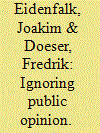

|
|
|
|
|
| Summary/Abstract |
This article investigates why the governments of Australia and Poland decided to contribute military forces to the United States led invasion of Iraq in March 2003 when a majority of Australian and Polish citizens were opposed to national involvement in the invasion. The objective of the article is to increase understanding of the conditions under which governments ignore the public in their foreign policymaking. The article examines the explanatory power of four intervening variables: issue salience, elite debate, timing of the next election and the importance assigned to international gains by the government. On the basis of the Direct Method of Agreement, the article concludes that government perceptions of international gains and the timing of the next election were potentially necessary factors for the outcomes of the cases, while issue salience and elite debate were not necessary conditions. A distant election may, thus, provide sufficient electoral protection for a government that conducts a foreign policy to which the public is opposed.
|
|
|
|
|
|
|
|
|
|
|
|
|
|
|
|
| 10 |
ID:
147966
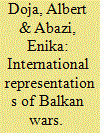

|
|
|
|
|
| Summary/Abstract |
This article introduces the socio-anthropological concept of international representations to examine the relationship between a civilizational rhetoric, the West European and the international politics of otherization and containment of Southeast Europe, and an essentialist and timeless bias in international relations theory, including both radical and constructivist trends. We first explore the different narrative perspectives on the Balkan wars from the beginning to the end of the twentieth century. Their subsequent problematization is aimed at challenging the way they have constructed commonplace and time-worn representations, which international society shares with different consequences in international affairs. This is a limited conception since international representations as a socio-anthropological concept are always socially, culturally and politically constructed, contested and negotiated. They do not neutrally refer to a reality in the world; they create a reality of their own. Moreover, this limited conception ignores the fact that how, by whom and in whose interest international representations are constructed is itself a form of power in international relations. Therefore, the way international representations are constructed can be problematized as an example of political and ideological projects that operate in the West as well as in the Southeast European countries that are the object of Western foreign policy.
|
|
|
|
|
|
|
|
|
|
|
|
|
|
|
|
| 11 |
ID:
147964
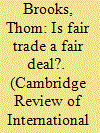

|
|
|
|
|
| Summary/Abstract |
Globalization contributes to a more interconnected global economy. This gives rise to greater challenges to providing a theory of global justice that can account for increasing complexities. Nicole Hassoun defends a powerful and distinctive contribution that claims that coercive institutions in the global order must secure sufficient autonomy to be legitimate because they are coercive. Fair Trade strategies are an illustration of a policy proposal for how globalization can be transformed into global justice. This article examines the issue of how much autonomy is ‘sufficient’ and whether a resource-based solution, like Fair Trade, is likely to contribute to that project. It is argued that the threshold for sufficient autonomy is too imprecise and much more than Fair Trade policies is required if global trade is to become a fairer deal for all.
|
|
|
|
|
|
|
|
|
|
|
|
|
|
|
|
| 12 |
ID:
147962
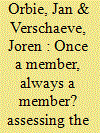

|
|
|
|
|
| Summary/Abstract |
This article examines the European Union's (EU's) full membership of the Development Assistance Committee (DAC) of the Organisation for Economic Co-operation and Development (OECD). More specifically, we address (1) why the EU became a full member of the DAC in 1961, long before the EU was granted legal competences for development policy, and (2) why this membership status has remained unaltered over the past half-century, despite persistent dissatisfaction among both EU and non-EU members of the DAC. By applying historical institutionalism, we find that the initial decision on the EU's membership status in the DAC created a path dependence that was impossible to reverse afterwards, despite changing internal and external circumstances.
|
|
|
|
|
|
|
|
|
|
|
|
|
|
|
|
| 13 |
ID:
147968
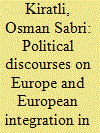

|
|
|
|
|
| Summary/Abstract |
Through a textual analysis of national election manifestos, this paper critically discusses political parties' discourses towards Europe and European integration in three European Union (EU) member states: Germany, which has always promoted further integration; the United Kingdom, which has consistently been a keen supporter of intergovernmentalism; and finally the Netherlands, one of the original six and a willing, yet cautious, supporter of supranational cooperation. By analysing how political parties frame European integration in their discourses, we aim to investigate the variance in national political cultures with respect to identity and self-identification with Europe as a determining factor of support for the process. This paper concludes that although European integration is structured around a framework of interests in all the six party discourses under analysis, the construction of national identities and hence the articulation of national interest in EU membership as well as the visions for the political structure of the union varies significantly.
|
|
|
|
|
|
|
|
|
|
|
|
|
|
|
|
| 14 |
ID:
147958
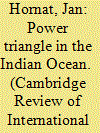

|
|
|
|
|
| Summary/Abstract |
The Indian Ocean is increasingly becoming the point of focus in assessing Asia's future security challenges. As both India and China are building up their naval presence in the Indian Ocean and as China's stakes in the region (protecting its maritime trade) interact with India's aspirations (being the regional dominant power and security provider), tensions are likely to rise. The United States has an established role in the Indian Ocean, and its approach to the contestation between Indian and Chinese interests may play a key role in limiting frictions. These developments have led many analysts to foresee the emergence of a balance of power system in the Indian Ocean region and East Asia which would be comparable to that of nineteenth-century Europe. In presenting the interplay between the three major stakeholders in the Indian Ocean, this paper aims to outline the implications of a balance of power system in the Indian Ocean region and demonstrate that it may not guarantee peace and stability, but, with regard to Organski's ‘power transition’ theory, could lead to quite the contrary.
|
|
|
|
|
|
|
|
|
|
|
|
|
|
|
|
| 15 |
ID:
147955
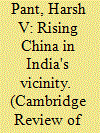

|
|
|
|
|
| Summary/Abstract |
New Delhi has been grappling with the challenge of China's rapid rise for some time now. Even as they sign loftily worded documents year after year, the distrust between China and India is actually growing at an alarming rate. True, economic cooperation and bilateral political as well as socio-cultural exchanges are at an all time high; China is India's largest trading partner. Yet this cooperation has done little to assuage each country's concerns about the other's intentions. The two sides are locked in a classic security dilemma, where any action taken by one is immediately interpreted by the other as a threat to its interests. This article examines the trajectory of contemporary Sino-Indian relations from India's perspective and argues that a troubled history coupled with the structural uncertainties engendered by their simultaneous rise is propelling the two Asian giants into a trajectory that they might find rather difficult to navigate in the coming years. This is an empirical analysis of India's changing approach towards China in the context of China's recent rise, not a theoretical exposition of the issue.
|
|
|
|
|
|
|
|
|
|
|
|
|
|
|
|
| 16 |
ID:
147961
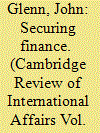

|
|
|
|
|
| Summary/Abstract |
This paper examines the changes that have been made to the global financial architecture in the aftermath of the financial crisis and argues that the reforms are confronted with a paradox. Intervention is required to ensure the smooth running of the economy, yet too heavy a hand risks disrupting a central circuit of capital. We have recently witnessed a tightening of the regulatory mechanism such that the parameters of risk taking have been reduced—financial activity now modulates within a more risk adverse environment. Yet, the reforms are not as radical as they could have been, reflecting the need to ensure effective and efficient circulation within an increasingly important area of the economy. However, a stronger emphasis on pre-emptive surveillance has emerged, which may partly compensate for the lack of radical reforms in other areas.
|
|
|
|
|
|
|
|
|
|
|
|
|
|
|
|
| 17 |
ID:
147959
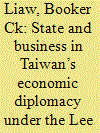

|
|
|
|
|
| Summary/Abstract |
This study suggests that a modified theory of new classical economics is useful in assessing Taiwan’s economic diplomacy during both the Lee Teng-hui and current administrations by means of a holistic perspective (levels of analysis). ‘Business‘ is the independent variable in the analysis. The theory of new classical economics implies that the utilities of Taiwanese investment are more effective than the contradictory political objectives of the Taipei government. The impact of business on the result of economic diplomacy is the unintentional easing of tensions across the Taiwan Strait while Taiwanese businesses have pursued profits. Collectively, businesses have strengthened the security of the Taiwanese state, while the Taiwanese government has pursued inconsistent policies (other variables) since President Lee took office. The holistic perspective is heuristic for understanding and explaining Taiwan’s economic diplomacy during the Lee Teng-hui administration. This approach produces the recommendation that the government provide disinterested and effective judicial systems and conclude investment guarantees, double taxation and free trade agreements to help Taiwanese businesspeople. In a wider context, Taiwan’s economic diplomacy aims not only to serve the interests of the government or state but also to further the interests of the Taiwanese state as a whole, including all residents of Taiwan.
|
|
|
|
|
|
|
|
|
|
|
|
|
|
|
|
| 18 |
ID:
147971
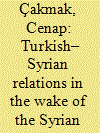

|
|
|
|
|
| Summary/Abstract |
This paper analyses the bilateral relations between Turkey and Syria since the breakout of the popular uprising in 2011, with particular reference to a securitization–desecuritization framework. The author inquires whether Turkish policymakers have securitized the Syrian civil war and framed it in security-laden discourse in the time period under review. Turkey extended strong support to the demonstrations and invested efforts towards a regime change. Assad’s response was unfriendly. Both the Assad regime’s policy vis-à-vis Turkey and the repercussions of the civil war in Syria posed serious threats to Turkish national security. However, based on the analysis of official statements by Turkish authorities during the crisis, the author argues that Turkey avoided framing the Syrian refugee crisis in security terms, whereas border violations, such as the downing of a military aircraft by Syrian regime forces, were defined as threats to national security. The paper further discusses the reasons for Turkey’s selective approach to issues concerning bilateral relations with Syria.
|
|
|
|
|
|
|
|
|
|
|
|
|
|
|
|
| 19 |
ID:
147969
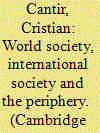

|
|
|
|
|
| Summary/Abstract |
Many studies of world society in the English School claim that non-state actors gain importance in international relations when they try to influence the most important members of the society of states. This article argues that such an approach overlooks the diversity of world society activities. First, it obscures the activities of world society actors beyond the core and therefore offers an incomplete account of the agency such actors exercise in global affairs. Second, it overlooks the fact that non-state actors from the core can disseminate some of the core’s values beyond its borders. The example of British abolitionist contact with the post-slave state of Haiti in the first two decades of the nineteenth century serves as an empirical illustration of these two points. The case study is particularly useful because conventional narratives of abolitionist activism tend to concentrate on contact with the core members of the society of states and overlook equally significant efforts to “teach” former slaves how to become respectable members of the society of states.
|
|
|
|
|
|
|
|
|
|
|
|
|
|
|
|
|
|
|
|
|